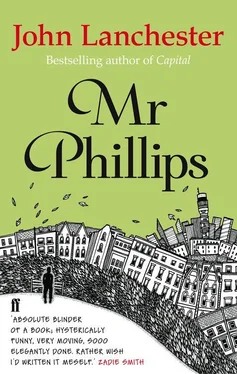Because the bus is momentarily at a halt Mr Phillips can hear the conversation of the two women in front.
‘Don’t know how she gets away with it,’ the woman on the left, who has an Irish accent, is saying. ‘If you or I did it we’d be arrested.’
‘And it’s not as if she’s younger than us.’
‘Older.’
‘The trout.’
‘And it’s not as if it makes her look ridiculous either,’ says the woman, with a note of wistfulness, before the bus roars off again and the rest of their talk is drowned out.
Mr Phillips looks at his watch, a silver-plated Omega with roman numerals which his father gave him as a present when he passed his charter exams. When Mr Phillips took the watch out of its box and looked up beaming to thank his father, the older man, with his arms crossed, merely said:
‘There. ’
At the time, that had seemed a perfectly natural thing to say; or at least Mr Phillips had felt he understood it. Now he sometimes looks at the watch and remembers his father’s single word and wonders whether it meant there , that’s the whole business of present-giving discharged — or there , you’re a grown-up now, you need to be on time — or there , the days of exams are behind you — or there , you’ll never again look at the time without remembering your father. Perhaps it really had meant, I’ll be dead one day. There are times when he looks at the watch and is overcome by a recollection so acute that he can feel the stubble on his father’s chin as he embraced him, and smell the slight sourness of pickled things on his breath. And at other times he just looks at his watch and thinks, Oh it’s five to two.
Now, though, it’s five past ten. The working day at Wilkins and Co. will be well and truly under way. When Mr Phillips was younger he had liked to be as late as was possibly consistent with keeping his job, and had been voluptuously reluctant to get out of bed. These days he likes, or liked, to be at his desk by nine fifteen, or half past at the very latest; he enjoyed setting off to work while still feeling a tad groggy, with wisps of sleep trailing behind him. There was something comforting about being seated at his desk opening his correspondence with faint vestiges of sleepiness rising off him like the steam off his day’s first mug of coffee. That mug would be brought to him by Karen if she was in yet, or made by Mr Phillips himself if she had had trouble with her journey or at home. (There is a man in her life. More than that Mr Phillips does not know, and does not want to know.) Karen often looked very slightly flushed in the mornings, something to do with make-up or getting up or, perhaps, rushed sexual activity, its memory bringing a glow to her cheeks like a remembered embarrassment. And her coffee tasted better than Mr Phillips’s too, which was a mystery, since it was made to precisely the same formula (two level spoonfuls of Gold Blend, water just off the boil, dollop of skimmed milk).
By half past ten Mr Phillips would hope to have read his correspondence and dictated replies to most of it. He still has his Dictaphone — it is in his briefcase at this very moment — even though it is strictly (or even not so strictly) speaking company property. But there is something so personal about this chunky piece of metal and plastic that he had felt obliged to cling on to it and to slip it home. The Dictaphone’s tiny micro-cassette cassette now holds replies to memos that will never be typed, signed and dispatched, letters that will never be sent, admonitions and excuses that will vanish into the electronic limbo of erased cassette tape. Mr Phillips takes the Dictaphone cassette out of his bag, holds the speaker to his ear and presses Play.
‘Reply to memo from Mr Street in Administration Department,’ Mr Phillips hears himself say, in the low, intimate, urgent voice he uses to his Dictaphone. ‘Check to see if the early memo included a blind copy to Mr Mill and if so copy him again.’
It was Mr Mill to whom the original memo should have been sent, if he had not been so reliably inclined not to do anything about anything, ever.
‘Memo begins:
‘There are difficulties with the proposal to save money by switching to a cheaper brand of sticky … of paper with … er, just say Post-It notes, Karen. Full stop. To wit comma Post-It notes are patented and no cheaper brand, change that to more reasonable brand, is therefore available full stop. Apparently they were invented by an out-of-work engineer in America full stop. At the moment the budget for this item of stationery comma which costs 49p a small packet comma is fifteen thousand pounds full stop. On balance I would favour a memo from Administration informing employees of this fact comma and pointing out that free access to stationery cupboards will one day become a thing of the past if unbridled consumption of office materials cannot be checked full stop. End of memo.’
Mr Phillips stops the Dictaphone and takes it away from his ear. It would be nice to have been the man who invented Post-It notes and to feel that your wealth was accumulating minutely but perceptibly every time someone peeled a little piece of yellow paper off a block and plunked it down on somebody else’s desk. Now Wilkins and Co. would never hear of his plan to save £7500, equivalent to almost a quarter of his own annual salary, by stopping people stealing so much stuff from the office for their own use. Mr Phillips is perfectly aware that this happens since he does it himself. In the days when Mrs Phillips taught in the evenings the whole family used to communicate primarily through stolen Wilkins and Co. Post-It notes.
‘The chicken is on a timer. Don’t touch any of the settings. Love Mum.’
‘I didn’t bring you a cup of tea this morning because you looked like you needed a lie-in. We’re out of bin liners.’
‘Martin: the stereo in the living room was still on when I got in last night and it was hot to the touch. HOW MANY TIMES MUST I REMIND YOU TO TURN IT OFF BEFORE GOING TO BED.’
‘Dad — five-a-side tournament moved till Sunday fortnight because of the flu epidemic can you still give me a lift Thomas.’
This might be a way of letting Mrs Phillips know what had happened.
‘Darling: I’ll probably be out late tonight wandering aimlessly around because I got the sack last week don’t wait up love Victor.’
The enormous advantage of this method would be that he wouldn’t have to be present to see her reaction, or — more probably and more painfully — her careful lack of reaction and attempt to act as if everything was OK. Knowing someone so well that you could anticipate their response to most things should make their responses easier to bear but in practice often does the opposite.
The traffic is crawling along the Embankment. Mr Phillips wants it to move more quickly, because that way there would be a greater variety of distractions. On the far side of the road, the footpath beside the river is busy with the last stray joggers of the morning, some of whom, fit scrawny men with little rucksacks, are clearly running to work. A group of twelve Gurkhas wearing olive-green T-shirts and shorts jogs past in tight formation, apparently heading for Chelsea Barracks.
About four hundred yards from Chelsea Bridge the bus stops again. There is the usual pause while people rummage for change to pay their fare and then the bus sets off. As it does so a very dishevelled man, evidently a tramp, comes to the top of the stairs. He wears a mouldy suit whose trousers are too big and whose jacket is too small, so that it seems he could burst all its seams by flexing his upper body. The trousers are kept up with knotted string. His shirt once was pink or orange. He wears shoes with the soles flapping loose and no laces, has obviously not washed or shaved for quite some time, and his face is a strange mottled purple colour. Asmell of meths or turpentine seems to rise off him. He carries three very full plastic bags. He could be any age from thirty to seventy.
Читать дальше




![Unknown - [Carly Phillips] The Bachelor (The Chandler Brothe(Bookos.org) (1)](/books/174132/unknown-carly-phillips-the-bachelor-the-chandle-thumb.webp)







